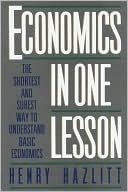More on this book
Community
Kindle Notes & Highlights
Read between
September 4 - September 24, 2023
The bad economist sees only what immediately strikes the eye; the good economist also looks beyond. The bad economist sees only the direct consequences of a proposed course; the good economist looks also at the longer and indirect consequences. The bad economist sees only what the effect of a given policy has been or will be on one particular group; the good economist inquires also what the effect of the policy will be on all groups.
“What is prudence in the conduct of every private family,” said Adam Smith’s strong common sense in reply to the sophists of his time, “can scarce be folly in that of a great kingdom.”
But lesser men get lost in complications. They do not reexamine their reasoning even when they emerge with conclusions that are palpably absurd. The reader, depending upon his own beliefs, may or may not accept the aphorism of Bacon that “A little philosophy inclineth men’s minds to atheism, but depth in philosophy bringeth men’s minds about to religion.” It is certainly true, however, that a little economics can easily lead to the paradoxical and preposterous conclusions we have just rehearsed, but that depth in economics brings men back to common sense. For depth in economics consists in
...more
And this is our lesson in its most generalized form. For many things that seem to be true when we concentrate on a single economic group are seen to be illusions when the interests of everyone, as consumer no less than as producer, are considered.
To see the problem as a whole, and not in fragments: that is the goal of economic science.
Economics broadens out in a hundred directions. Whole libraries have been written on specialized fields alone, such as money and banking, foreign trade and foreign exchange, taxation and public finance, government control, capitalism and socialism, wages and labor relations, interest and capital, agricultural economics, rent, prices, profits, markets, competition and monopoly, value and utility, statistics, business cycles, wealth and poverty, social insurance, housing, public utilities, mathematical economics, studies of special industries and of economic history. But no one will ever
...more


